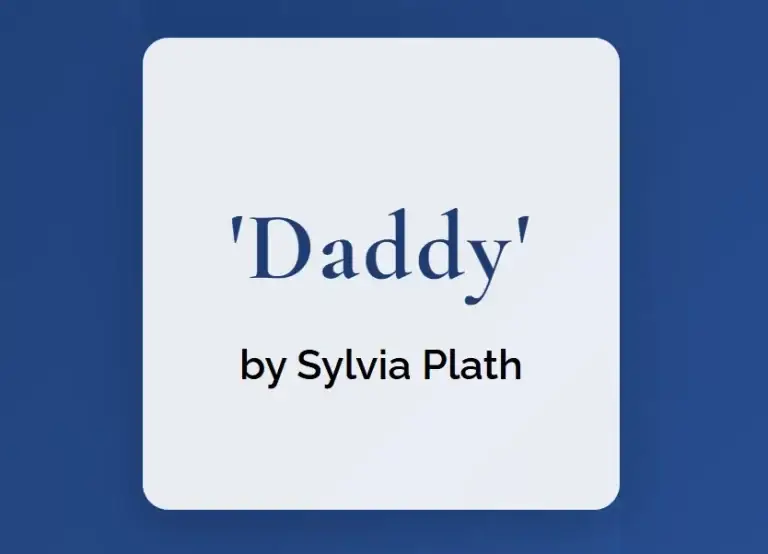Introduction
In her poem “Daddy,” Sylvia Plath takes readers on a harrowing journey through the landscape of personal trauma and the struggle for identity. The poem delves into the complex relationship between Plath and her father, using stark imagery and powerful metaphors to explore themes of oppression, liberation, and the lasting impact of childhood experiences. Through her raw and unflinching verses, Plath invites readers to confront the often painful process of confronting one’s past and reclaiming one’s identity.
Table of Contents
The Father Figure as Symbol
The central symbol in “Daddy” is the imposing figure of the father, which serves as a metaphor for various forms of oppression and control. Plath writes:
You do not do, you do not do
Any more, black shoe
In which I have lived like a foot
For thirty years, poor and white,
Barely daring to breathe or Achoo.
The image of the black shoe represents the confining nature of the father’s influence, with the speaker feeling trapped and suffocated by his memory even years after his death.
Confronting Historical Trauma
Throughout the poem, Plath draws parallels between her personal experiences and broader historical traumas, particularly the Holocaust. She writes:
An engine, an engine Chuffing me off like a Jew.
A Jew to Dachau, Auschwitz, Belsen.
By invoking these powerful and disturbing images, Plath emphasizes the depth of her emotional pain and the feeling of powerlessness in the face of overwhelming forces.
The Search for Identity
Plath also explores the struggle to forge one’s own identity in the shadow of a dominant figure. She writes:
I have always been scared of you,
With your Luftwaffe, your gobbledygoo.
And your neat mustache And your Aryan eye,
bright blue. Panzer-man, panzer-man, O You——
The speaker’s fear and fascination with the father figure highlight the difficulty of separating one’s own identity from the influence of a parent or authority figure.
Literary Techniques in “Daddy”
Plath employs various literary techniques to convey her message powerfully. Her use of repetition, particularly with phrases like “You do not do” and “Daddy, daddy, you bastard,” creates a rhythmic intensity that mirrors the speaker’s emotional state. The vivid and often disturbing imagery, such as the “black shoe” and the Holocaust references, adds a visceral dimension to the poem, making the speaker’s pain palpable to readers. Her masterful use of metaphor extends throughout the work, drawing parallels between personal and historical oppression.
The poem’s distinctive rhythm and sound patterns, marked by harsh consonants and Germanic words, reinforce its themes of power and subjugation. Plath’s strategic use of color symbolism, particularly black and white imagery, creates stark contrasts that emphasize the binary nature of the speaker’s emotional landscape. The carefully constructed stanzas build upon each other with increasing intensity, while allusions to historical events and figures add layers of meaning that deepen the poem’s impact.
Conclusion
“Daddy” is a searing and unforgettable exploration of trauma, identity, and the struggle for personal liberation. Through her brutally honest and emotionally charged words, Sylvia Plath confronts the lasting impact of childhood experiences and the challenge of defining oneself in the face of overwhelming influences. The poem serves as a powerful reminder of the complexity of human relationships and the enduring strength required to overcome personal and historical traumas. This masterwork stands as a testament to the transformative power of poetry in confronting personal demons and societal oppression.
The raw emotional honesty combined with technical sophistication creates a work that resonates deeply with readers across generations. Through its unflinching examination of father-daughter relationships and the intersection of personal and political power dynamics, the poem continues to illuminate universal truths about human nature and the quest for self-determination. Its enduring impact lies not only in its brave confrontation of difficult themes but also in its demonstration of how artistic expression can transform personal pain into universal understanding.


